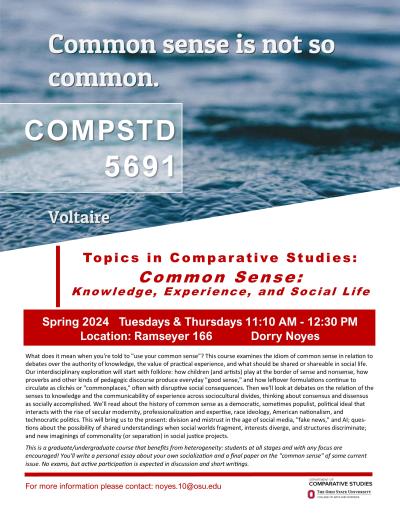
Topics in Comparative Studies: Common Sense: Knowledge, Experience, and Social Life
Tuesdays and Thursdays 11:10 AM - 12:30 PM, Ramseyer 166
Dorry Noyes
What does it mean when you're told to "use your common sense"? This course examines the idiom of common sense in relation to debates over the authority of knowledge, the value of practical experience, and what should be shared or shareable in social life. Our interdisciplinary exploration will start with folklore: how children (and artists) play at the border of sense and nonsense, how proverbs and other kinds of pedagogic discourse produce everyday "good sense," and how leftover formulations continue to circulate as clichés or "commonplaces," often with disruptive social consequences. Then we'll look at debates on the relation of the senses to knowledge and the communicability of experience across sociocultural divides, thinking about consensus and dissensus as socially accomplished. We'll read about the history of common sense as a democratic, sometimes populist, political ideal that interacts with the rise of secular modernity, professionalization and expertise, race ideology, American nationalism, and technocratic politics. This will bring us to the present: division and mistrust in the age of social media, "fake news," and AI; questions about the possibility of shared understandings when social worlds fragment, interests diverge, and structures discriminate; and new imaginings of commonality (or separation) in social justice projects.
This is a graduate/undergraduate course that benefits from heterogeneity: students at all stages and with any focus are encouraged! You'll write a personal essay about your own socialization and a final paper on the "common sense" of some current issue. No exams, but active participation is expected in discussion and short writings.
